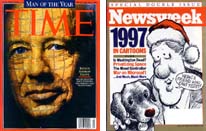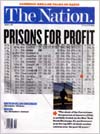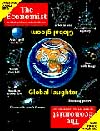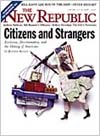0

New York Times Magazine, Dec. 28
(posted Thursday, Dec. 25)
The cover story argues that Brooklyn's 1897 merger with Manhattan was a mistake. It damaged Brooklyn's local industries (especially shipping), and it led to oppressive citywide taxes and regulations that still stymie the borough (e.g., today's developers build in New Jersey because it doesn't make sense to pay Manhattan real-estate taxes on Brooklyn property). The magazine revisits Mary Ann Moore, a Chicago woman it profiled three years ago as a welfare-to-work success story: She has lost her job and has fallen back into drug addiction. Lesson: Overworked, undertrained caseworkers have neither the time nor the skill to shepherd those who most need help. A piece describes a New York clinic that treats torture victims, both psychologically and physically. According to estimates, there may be as many as 200,000 torture survivors in the United States: This is the only clinic dedicated to their care.

Time and Newsweek, Dec. 29 and Jan. 5
(posted Tuesday, Dec. 23)
Time picks Intel CEO Andrew Grove as its Man of the Year because microchips are integral to our economy, and Grove's paranoid business style has kept Intel first in the industry. Grove lived through World War II as a Jew in Budapest, escaped Hungary when the Soviets took over, excelled in an American college despite barely speaking English, and overcame prostate cancer and severe hearing loss. (Average Joe fact: Grove's office is a tiny cubicle just like Intel's lowliest programmers use.) An accompanying piece explains how microchips work. Time's runners-up: Alan Greenspan, Princess Di, philanthropist Charles Feeney, and sheep cloner Ian Wilmut. (Click here to read about Slate's Man of the Year.)
Newsweek presents the year in cartoons. (A man and woman are in bed. Man: "Politicians, Hollywood stars, military personnel ... Seems like everybody's sleeping around." Woman: "You sound just like my husband.")
Time names its best and worst of 1997. Winners: the Guggenheim at Bilbao, L.A. Confidential, and Volkswagen's "Da Da Da" ad. Losers: celebrity-authored books, ER's live episode, and Robin Williams.
Newsweek assesses the future of commercial space travel. Civilian flights are coming in the next century, and soon, the companies promise, they'll mine asteroids for gold and ship packages from Los Angeles to Tokyo, via orbit, in 45 minutes. Newsweek also wonders if the neurotransmitter serotonin is the key to life. Serotonin, the magic behind Prozac, fen-phen, and Saint Johnswort, may bring "happiness, high social status and a nice, flat stomach."

U.S. News & World Report, Dec. 29 and Jan. 5
(posted Tuesday, Dec. 23)
Its year-ender offers 16 "Smart Ideas to Fix the World." Among them: Tax fatty foods to help Americans slim down, filter Chesapeake Bay with billions of silt-eating oysters, put public schools in large workplaces, and fire Monday Night Football's commentators. Also, a week after Time and Newsweek, U.S. News runs an inferior year-end photo package. An article mourns the 1997 deaths of some lesser-known heroes: the inventor of the yield sign and the original Hamburglar, among others.

The Nation, Jan. 5
(posted Tuesday, Dec. 23)
The cover story blasts private prisons, noting that their share of the inmate population will more than double by 2002. These commercial facilities are rife with corruption and only cut costs by lowering security and depriving prisoners of recreation and education. Ultimately, they don't save taxpayers anything. An article rages over the end of the seniority-based workplace: Middle-aged workers can no longer expect steady wage increases and stable employment. Also, an essay mocks Dinesh D'Souza's biography-cum-love-letter to Ronald Reagan. The right embraces it as the "ur-text on Reaganism," but it's really just shameful revisionism.

Weekly Standard, Dec. 29 and Jan. 5
(posted Tuesday, Dec. 23)
Miss America 1944, Venus Ramey, chastises Miss America 1998, Kate Shindle, for pushing condom distribution in schools as an AIDS-prevention measure. Ramey's "open letter"--"from an old bathing-suit bimbo to a young one"--sasses Shindle for assuming that she's now a public-policy expert: "Does winning a college scholarship with the bod suddenly make one all-knowing? ... I also come from an era when we had a name for girls who hand out condoms, and it wasn't Miss America." An article contends that Russia is faring much better than experts say it is. Crime has been falling for several years, most of the economy is privatized, and real reformers like Yegor Gaidar have made headway against fake reformers like Boris Berezovsky.

Economist, Dec. 20 and Dec. 27
(posted Saturday, Dec. 20)
A Christmas double issue. The lead editorial stresses the severity of Asia's financial problems and asserts that they could well spread to the rest of the world. The Economist's solution? As always, the free market: Asian governments shouldn't block capital flows or choke the money supply. An article says current forecasts of ecological doom are greatly exaggerated. Environmentalists have long predicted the imminent exhaustion of fossil fuels, but there are more oil reserves now than ever. (See Slate's "The Motley Fool" on how technology is aiding oil exploration.) A story says Americans are getting fatter (54.4 percent of adults are overweight, 22.5 percent are obese). The causes: Americans eat more, exercise less, and increasingly tolerate tubbiness. (Read Slate's "Dialogue" on fat.) Also, a story looks at what the world laughs at. Blondes and Bill Gates are globally funny, but regional humor persists. A newly rich Russian crashes his Mercedes and starts wailing about the car: " 'How can you worry about your car,' asks a passer-by, 'when your arm is ripped off?' The Russian looks at his stump and bawls: 'My Rolex!' "

New Republic, Jan. 5
(posted Friday, Dec. 19)
A story rages at William Bennett's assertion that the average life expectancy for gay men is 43 years. The figure is false, the source of the figure is a wacko, and Bennett's conclusion that homosexuality should be discouraged is abhorrent. (For Slate's take, see "William Bennett, Gays, and the Truth.") The Republican Party's opposition to Bill Lann Lee and skepticism about immigration have alienated once-friendly Asian voters, says an article: George Bush won the Asian vote by 27 points in 1992, but Bob Dole won it by only five points in 1996. A story questions the heroism of the much-honored "Hollywood Ten." These blacklist victims, who refused to squeal on colleagues, were untroubled by Stalin's murderous reign and benefited from the capitalist system they denounced.

Wired, January 1998
(posted Tuesday, Dec. 16)
The fifth-anniversary issue includes rosy essays from various cyberpundits: One predicts an Internet population of 1 billion people by 2000. Another argues that the past five years have been the greatest in human history (due to advances in health and quality of life). Also, the "State of the Planet 1998" section features a series of bizarre images overlaid with haikus from the editors or quotes from people such as Laurie Anderson, Noam Chomsky, and Andy Grove. (For example, a picture of a woman with tubes coming out of her head is captioned, "Technology is the campfire around which we tell our stories.")
--Seth Stevenson
